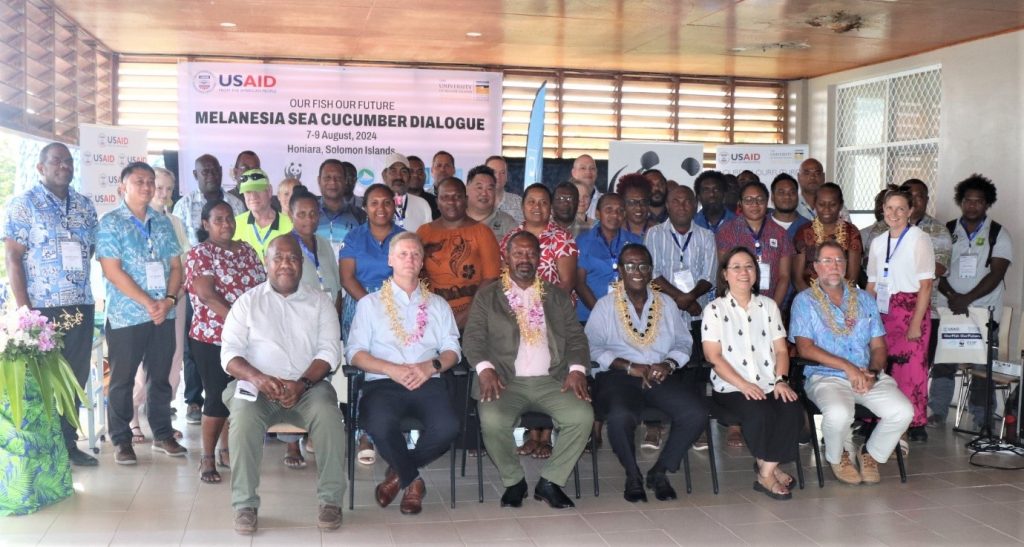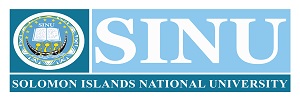𝐏𝐫𝐞𝐬𝐬 𝐑𝐞𝐥𝐞𝐚𝐬𝐞
𝟎𝟕-𝟎𝟖-𝟐𝟎𝟐𝟒

Participants at the Opening of the Sea Cucumber Dialogue
The USAID OurFish Our Future – Melanesia Sea Cucumber Dialogue is underway at the Solomon Islands National University.
The Melanesia Sea Cucumber stakeholders dialogue held under the theme, “Our Fish Our Future” which started today will end on Friday this week.
The goal of the dialogue is to gather information, best practices and potential input to the review of the Melanesian Spearhead Group Secretariat (MSG) Roadmap for sustainable inshore fisheries 2015-2024, which is supported by the USAID project.
The objectives of the dialogue are as follows; Sharing successes and challenges on managing sea cucumbers in the Pacific region, identifying opportunities to develop or expand on regional, national, and local policies, building a Community of Practice to share data, information, and best practices across countries, and Engaging stakeholders at local, national, and regional levels to identify solutions to improve and empower management of sea cucumbers at the community-scale.
The dialogue, which began this morning, was attended by representatives from the University of Rhode Island, USAID, WWF, as well as delegates from Solomon Islands, Papua New Guinea, Vanuatu, and Fiji.
Speaking at the official opening of the dialogue, the Minister of Fisheries and Marine Resources, Hon.Nestor Ghiro said the dialogue comes at a crucial time as we collectively work towards sustainable management and restoration of sea cucumber stocks across the Melanesia region.
Hon.Ghiro said Solomon Islands Government through the Ministry of Fisheries and Marine Resources has been deeply committed to the sustainable management of our marine resources.
He said our sea cucumber fisheries, a valuable asset to our economy and marine biodiversity, have faced challenges due to overexploitation, stating recognizing this, we have implemented several key initiatives to ensure their recovery and long term sustainability. He said one of our flagship programs has been the restocking of sea cucumbers.
“This initiative involves transferring hatchery-raised juvenile sea cucumber to open reef systems. This program not only aims to replenish depleted wild stocks but also provides valuable data for planning large-scale breeding and management efforts across the country. In addition to restocking, the Ministry has developed a comprehensive sea cucumber fishery management policy, set to be implemented soon. This policy is designed to address the current overexploitation by introducing measures such as controlled harvest seasons. We are also dedicated to enhancing our data collection and monitoring system to inform better management decisions. The Ministry of Fisheries and Marine Resources is actively engaging with local communities, stakeholders, and regional partners to ensure that our management practices are both effective and inclusive. With that, he said this dialogue is an excellent opportunity for us to share our successes and challenges, identify opportunities for policy development, and build a robust community of practice. By sharing data, information, and best practices, we can empower each other to manage sea cucumber fisheries at the community level effectively.”
“I am told that a significant goal of this dialogue is to gather insights that will contribute to revising the MSG roadmap for sustainable inshore fisheries 2015-2024.This roadmap emphasizes the importance of sea cucumber management and restoration, aiming to maximize long-term economic value and ecological sustainability.”
At the official opening of the three days dialogue, Director WWF Pacific Dr. Mark Drew encouraged participants to share their thoughts and expertise in the subject matter stating he is looking forward to the outcome of the three days dialogue.
Vice Chancellor of SINU, Professor Transform Aqorau also spoke at the event highlighting the critical importance of sustainable management in the sea cucumber industry, a vital economic lifeline for our coastal communities.
In his speech Prof.Aqorau addresses the pressing issues of over-exploitation and the need for robust management practices to secure the future of our sea cucumber stocks. Drawing on his experience with the Vessel Day Scheme for tuna, he illustrated how innovative business models that empower resource owners can lead to sustainable and economically beneficial outcomes. The SINU VC also emphasised the importance of community involvement and the use of emerging technologies to enhance supply chain transparency and sustainability.
End/////////////////////
